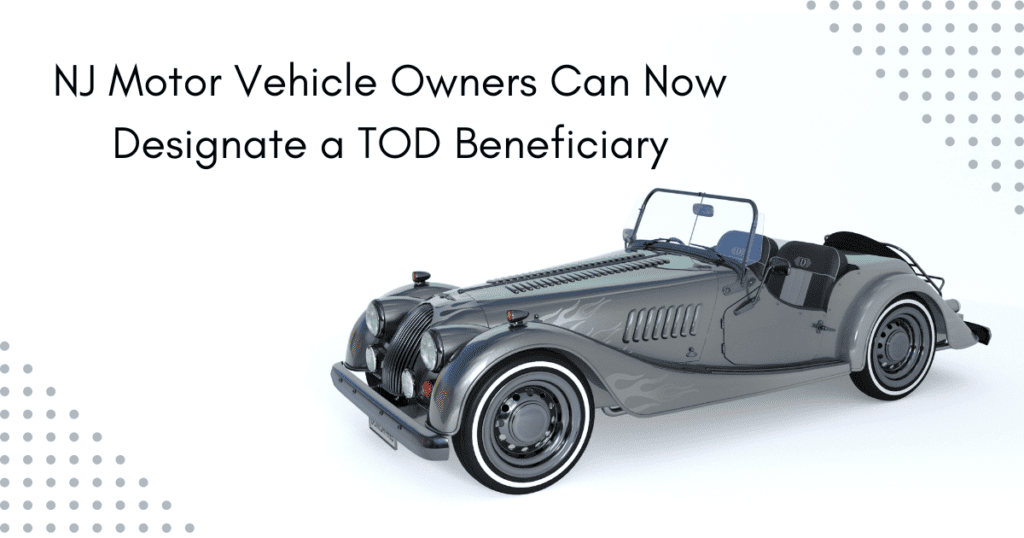Dealing with death and probate is never easy. However, over the past decade, New Jersey has done a number of little things to make various parts of the probate and estate administration process more manageable. In 2016, NJ adopted the Uniform Trust Code, which makes it much easier to modify an irrevocable trust without having to go to Court. In 2018, NJ repealed its state estate tax. Now, NJ motor vehicle owners can designate a transfer on death beneficiary.
In this article, we talk about:
- Why is this change important to NJ Motor Vehicle Owners?
- How do you designate a beneficiary?
- How does the beneficiary change ownership following the death of the original owner?
- The NJ motor vehicle TOD Beneficiary Form can be used for many types of vehicles
- Keep in mind – a NJ Inheritance Tax may still be due
- Summary
Why is this change important to NJ Motor Vehicle Owners?
Allowing a motor vehicle owner to designate a TOD beneficiary means that the vehicle can pass outside the probate process. There are many reasons to avoid probate. Probate can be difficult or take a long time. If an asset is part of the probate estate, it can be much more easily subject to creditor claims compared to an asset that passes directly to a beneficiary.
As a practical matter though, this change is important because, in the event of the death of a NJ motor vehicle owner, it allows their preferred beneficiary to receive the vehicle more quickly and without having to rely on an executor or administrator being appointed. Allowing for a NJ motor vehicle to pass directly on death to a beneficiary, rather than being part of the probate estate, means that the vehicle doesn’t sit for months or years on end without being put to use. An estate typically can only keep insurance on the vehicle for so long and an executor typically can’t re-register the vehicle easily. (A vehicle in the name of a decedent may only be operated for 30 days after the owner’s death.)
How do you designate a beneficiary?
NJ motor vehicle owners can designate a transfer on death (TOD) beneficiary by going to the NJ MVC website and downloading the NJ motor vehicle TOD form. The owner should complete the TOD form, sign it, and have it notarized. The TOD form should be kept in a safe place and only filed with the NJ motor vehicle commission following the death of the owner. There is no fee to download or complete the form.
How does the beneficiary change ownership following the death of the original owner?
Following the death of a NJ motor vehicle owner, the beneficiary would take the fully executed TOD form to the NJ DMV along with the title, a death certificate for the original owner, and a universal title application. There will be a fee at this point for obtaining a new title and registration.
The NJ motor vehicle TOD Beneficiary Form can be used for many types of vehicles
There does not appear to be any restriction regarding what type of vehicle the form applies to. The form should be good for cars, motorcycles, campers, trucks, etc. Keep in mind though that if the motor vehicle is owned by an entity, such as a corporation, the form should not be used for that (as a corporation doesn’t technically die).
Keep in mind – a NJ Inheritance Tax may still be due
Just as a reminder, although the NJ MVC Transfer on Death form allows for the vehicle to pass outside of the probate process, it does NOT mean that it passes without tax consequences. While NJ repealed its estate tax, it does still have an inheritance tax. There is no NJ inheritance tax for transfers to spouses, ascendants, or descendants. However, there may be a tax if you make a transfer on death to siblings, nieces, nephews, more remote relatives, step-grandchildren, or friends.
Summary
A good estate plan should always consider the pros and cons of transferring assets via beneficiary designation, being part of a trust, or passing through an estate. Allowing NJ motor vehicle owners to designate a TOD beneficiary provides you with one more important tool for avoiding probate. If you have any questions about your estate plan, minimize probate, or the estate administration process, our probate attorneys are available to assist.




